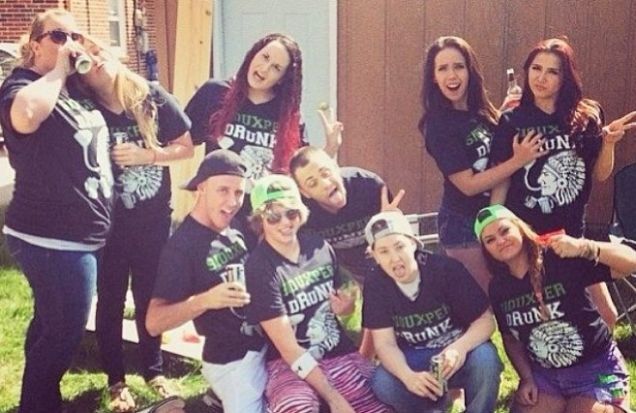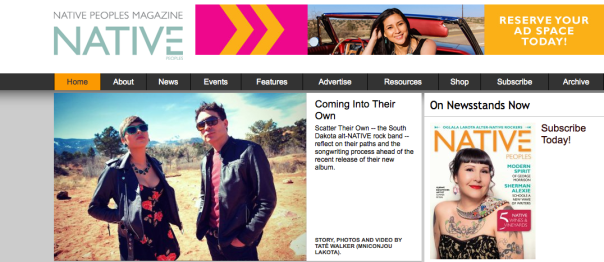‘Redskin’ is a dictionary-defined slur. So I don’t know where the debate is.
– Simon Moya-Smith
Like anything Fox News puts out there, this clip of last night’s Kelly File is hard to watch (for the well-informed progressive-types, that is). The segment looked at a recent letter signed by 50 US Senators asking the NFL higher-ups to endorse a Washington Redskins name change (a reminder that Natives have been pushing for this same thing for decades, including the National Congress of American Indians). Simon Moya-Smith, whom Kelly’s producers brought on the show after CNN published his spot-on op-ed, does a fantastic job holding his own against three non-Native bigots interested only in sensationalism and the bottom line. If you’re looking for a great example of whitesplaining Native issues and concerns, this video is for you.
Ben Shapiro is the definition of patronizing condescension when he says in the clip that Native Americans have more to worry about than mascots. The Redskins name, he says, “… is about 100 on the list of issues facing Native American communities today.” Two things: (1) Please, tell me more about what I need to concern myself with, Mr. Shapiro. And (2) It’s dangerous – DANGEROUS – to bypass the solid, proven links between mascots and the disparities in health, education, and employment Native Americans face.
The fact of the matter is these words and images – mascots and logos and names like those found on the Washington NFL team – are *harmful.* Like Big Tobacco lobbyists, mascot/name supporters like to say there is no direct link between the Redskins and the vast, plague-like troubles Natives face on a daily basis. “Oh, come on,” they say. “It’s *just* football. The kid who killed himself in Eagle Butte last week didn’t do it because he saw a Redskins football game.”
But like the tar, the arsenic, and the other 4,000-some chemicals wrapped nicely in kid-friendly cigarette packaging, the poison inherent in mascots and racist team names takes root over time. One or two puffs on any given Sunday and you’ll live. But years of exposure to the smoke of systemic, capitalized racism will fester, and, like all cancers, will eventually kill – if not the body, then for sure the spirit.
With each game, with each Faux News-like broadcast, and with each successive PR stunt from the Dan Snyder Is Clueless Factory, mascots and team names like the Redskins reinforce to Natives and non-Natives alike that ours isn’t a cause people care about. That football rates higher than Native people. We are only as good as a game-winning touchdown. We wipe our tears with your jerseys, and thank you for the honor. “Here we are now,” the crowd screams. “Entertain us.”
Native youth especially measure their worth based on how others view them. So, yeah, that Redskins game – the one where the opposing team’s fans held high the bloody head of a plastic Indian – may very well have fed into the fears of a Native kid who thought he was worthless. That’s why I, personally, advocate to end the use of racialized mascots and names, which are classic dehumanization tactics used in genocidal campaigns to show one demographic is *less* (read more here). This isn’t just some Angry Indian, butt-hurt, anti-sport, layman’s POV. This is Psychology 101.
From the American Psychological Association:
APA’s position is based on a growing body of social science literature that shows the harmful effects of racial stereotyping and inaccurate racial portrayals, including the particularly harmful effects of American Indian sports mascots on the social identity development and self-esteem of American Indian young people.
From Philip Zimbardo’s “The Lucifer Effect“:
Dehumanization is the central construct in our understanding of ‘man’s inhumanity to man.’ Dehumanization occurs whenever some human beings consider other human beings to be excluded from the moral order of being a human person. The objects of this psychological process lose their human status in the eyes of their dehumanizers. By identifying certain individuals or groups as being outside the sphere of humanity, dehumanizing agents suspend the morality that might typically govern reasoned actions toward their fellows.
Native appropriation and dehumanization – these physically, emotionally, and sexually violent images – makes our decent into the abyss easier for the masses to swallow: “Oh, they’re just Redskins. Just Siouxper Drunks. Just Halloween costumes, fashion accessories, and characters for actors to play. And just a token Indian to run over when we put him on an editorial news show.”



Another issue brought up in Kelly’s circus act was the idea that polls and surveys prove Native Americans and the public at large are totally fine with the Redskins team name. Polls? Surveys? “I think it’s really interesting,” Simon says to Kelly in the clip when she asks him about those ‘Polls’ (show me the money!). “It’s like, what Indians? You have an Indian before you.” Sadly, we are not enough, individually. But I digress. These polls are NEVER done on a reservation or in areas of mass Native concentrations. Not many living in those areas have the resources or infrastructure to take surveys like these in the first place. Beyond this, Native Americans make up about 2 percent of the total US population — let’s talk about how much the other 98 percent knows (or, better yet, cares) about our culture and history? <– Those are the people taking these polls and surveys, which we all know can be skewed toward whatever end you’re reaching for (that’s studied in Journalism Ethics 101, btw).
Finally, I want to talk about Simon’s assertion of the term ‘redskin’ being a dictionary-defined racial slur. It is. Like other derogatory terms, it’s hurtful and goes right back into the whole dehumanizing discussions above. Not so long ago, the ‘red skin’ of my ancestors was worth a big bounty. In the clip Simon points out, “Racial slurs toward Native Americans haven’t been rubbed out… People think it’s OK to denigrate Native Americans because it’s ‘their tradition.’ What about our tradition?”

Kelly demands Simon play the dictionary and asks, “What does it mean to denigrate? Just to say the word? Because let’s take the N-word for example. If it’s uttered by certain people, it’s considered grossly offensive. If it’s uttered by certain people – rappers, for example – it’s not considered offensive. So the Washington Redskins – that name was born at a time that it wasn’t found offensive, and most of the fans don’t find it offensive, most of the nation doesn’t find it offensive. Now, today, you tell me some – some portion of folks do find it offensive. So what makes a name truly derogatory or not?”
Truly derogatory? You mean, if you’re not personally offended by it, then it’s not really offensive? Lot’s of 101s going around today, and this is White Privilege rearing it’s ugly, blonde head. I’m not going to touch the N-word comment. Too many mascot protesters overuse and misuse the “double-standard” concept in their debates and completely throw our fellow minorities under the racism bus in order to prove a point (I admit to being one of these people until shown the error of my ways about a year ago). Yes, there are many people, Natives included, who do not find the term redskin offensive. But there are, in fact, Natives offended by the term, despite its origins, modern intents, and celebrity mouthpieces. The fact that a major non-Native entity supported by a vast majority of non-Native people approves of a term many Natives – Simon and me included – are personally offended by is racism.
The best thing to happen in the clip comes right after the slur discussion when sportscaster Jim Gray jumps in and says, “If you were naming a team today, Megyn, you could guarantee one thing: They would not name the new Washington baseball team the Redskins.” And she agrees, which totally goes back to the White Privilege comment: If a tree falls in the woods, it only makes a sound if a white person hears it.
Still: Point to Simon!
This will continue to be “debated” for years to come, but I promise you Natives will be victorious on this issue. We have to be. The self-esteem and morale of generations of young people – like my daughter – depend on it. I’ll leave you with this piece from “Psychology Today” and the Science of Small Talk:
In the end, these data pose a problem for claims that these mascots are honorific and likely to enhance the self-esteem of Native Americans. Even when that is (or has recently become) the motivation behind a team name, such good intent is not sufficient to bring about good outcomes. As the authors of the paper described above explain, “American Indian mascots do not have negative consequences because their content or meaning is inherently negative. Rather… [the mascots] remind American Indians of the limited ways in which others see them.”
